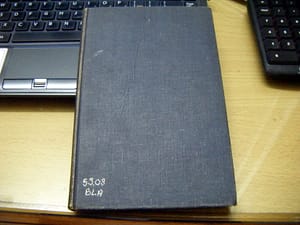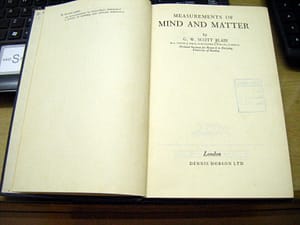关于书
[AMAZONPRODUCT=B0000CHRBO]
我上个月在Amazon买的三本书今天到了其中一本:Measurements of Mind and Matter,作者是G. W. Scott Blair。我曾经在两篇文章中都提到了Scott Blair这个人,最近的一篇说了要买他的两本书。其实原因并不是因为想学习流变学——他的书是半个多世纪以前写的了。我想看他的书,原因一方面是受他写的paper的文笔所感染,另一方面是想了解一下流变学的历史。虽然,关于这个学科的历史,Water等人已经合著过Rheology — A Historical Perspective一书,比较详细:
[AMAZONPRODUCT=0444829458]
另外,Deepak Doraiswamy写的一篇文章标题为The Origins of Rheology: A Short Historical Excursion的短文其实资料也很详细。但是,以上的资料作者是带着写历史的目的去写的。而Scott-Blair的书是写他当时的看法,不是后人为写历史而作的解读,因此是第一手资料。
Scott-Blair的研究和学术观点似乎在当时常常被批评。我在Scott-Blair论流变学的两个目的和吵架一文中已经介绍过有人对他的另一本书A Survey of General and Applied Rheology进行批评,他还“激情回应”过。现在我手头上这本Measurements of Mind and Matter的前言里作者自己也承认:
Recently, moreover, I have for some time been tinkering with the theory of dimensions in my own field of rheology and have been criticized for doing so. Whether these criticisms are justified is not for me to say but, naturally enough, it had not failed to occur to me, as soon as I saw where any satisfactory explanation of the data from my experiments was leading me, that it would never do to tinker with dimensions without first making a fairly thorough study of the classical theory, so I made something of a hobby of the subject.
我另外找到了一个criticism例子。Measurements这本书出版之后,在The British Journal for the Philosophy of Science上有一篇长达两页半的书评,全篇没讲过好话,都不知道引哪段好,大家还是自己去看吧。我认为这个书评不能说不中肯,但是Scott-Blair连一般的研究性论文都写得很像散文,这本书于是也不应该当成学术专著来看。不知道是不是因为Scott Blair被批评得太多,因此Barnes在他的关于触变性的review里这么说:
Readers with an interest in the historical derivation of scientific expressions are directed to Scott-Blair [10], p.52. All Scott-Blair’s books were written as personal memoirs and are very evocative of the man himself for those who knew him.
意思似乎是说那些批评他的人其实都不懂他。

Cover

Dedication

Other Books by the Author Page & Title Page
上面是我收到的书的实拍图。虽然是二手书但还是非常完好。这本书也是按照很经典的book design,打开cover,先来一页空白的,叫做end paper。然后,就轮到half title page,这一页上面只有书的标题,其他啥都没有。然后翻过这一页的背面有Other Books by the Author。再然后,就轮到title page,有书的标题、作者信息、出版社,翻过背面是出版信息。接下来就是dedication页,上面写着:
This little book is dedicated to all those who are not afraid to cross frontiers
上面提到的不友善的书评恰恰抓住了这个dedication来进行嘲讽。基于作者受到的criticism,我觉得这句话更对,或者可以改得更直接些:This little book is dedicated to all those who are not afraid to cross frontiers, and of the criticisms that come afterwards.
关于所谓“科普”
当然,我到现在还没有正式把书看完,也许这书确实很烂。但我今天光看了第一章,就发现一些很值得一提的闪光点,是关于“科普”的。
首先,貌似早在此书出版的那个年代(上世纪50年代),大众认识与科学研究之间的鸿沟已经成为“瞩目”的问题,以至作者有兴趣对此给出一个他个人的解释(接下来还会引用大段大段的英语,因此我自己作了一些翻译):
[I]n science it is a mistake to visit the sins of the fathers upon the children and that the mistakes of the nineteenth-century psyco-physicists presumably serve as a warning to their successors in the twentieth century, who should therefore be less and not more likely to fall into the same type of snare. This tendency of scientists to develop ‘preferred fields’ and to despise work in the forbidden borderline territory, may well be one of the causes of the remarkable lack of popularity of science among the general public. Whatever the politics of the man in the street of this generation may be, snobbery is at a discount and I think that perhaps he feels, not without some cause, that there is too much intellectual snobbery among scientists.
在科学研究的过程中,不要延续前辈的失误。十九世纪的心理-生理学家所犯的错误应该为二十世纪的后辈有警示作用。后辈们应该尽少落入相同的陷阱中去。科学家们优先发展他们所爱好的研究领域,却对超出领域范围的工作加以鄙视的这种倾向,多多少少阻碍了科学在一般大众之间的流行。无论一个时代的流行意识形态是什么,在一般大众(man in the street)看来,迷信权威总是不光彩的,而科学家则往往被认为太迷信权威了。
Scott-Blair似乎很喜欢用“街男”(man in the street)来表达跟laymen(外行大众、普通百姓)差不多的意思。因为后面他继续举了个当时电台的例子:
We have only to look at the general standard of scientific journalism or at the amount of time allocated to science by the B.B.C. to realize how little scientific matters mean to the general public. The B.B.C. bases its choice of programmes on ‘Listener Research’ and, within the tiny fraction of its time devoted to science it arranges not only for the best research workers to speak but, lest the scientist should often prove a bad advocate in his own cause, there are feature programmes in which professional actors and broadcasters use their skill to interest the public in science. Yet from the total time allowed to it, even by comparison with music, drama or literature, science is evidently of very little interest to the man in the street in spite of its obvious threats to his peace of mind or potentialities for the increase of his comfort.
No, science is technical, difficult and dull and is generally supposed to deal with abstract matters which have little connection with everyday life except, of course, in so far as the power which it brings increases our dangers or improves our amenities.
Of course, it would be as fatal to popularize science by compromising its principles as it has been to pursue such a course with religion. People will accept hard sayings not by compromising them but by making them meaningful. In our struggle towards what Lancelot Whyte calls ‘the Science of Man’, we are held back by many things, not least by this idea of ‘preferred fields’.
我们只要看一下一般的科学媒体,例如BBC电台花在科学上的时段长短,就能了解科学对于一般大众是多么无足轻重。BBC的做法是基于他的听众研究结果的,在微不足到的时间里,电台不光邀请了最好的研究者来介绍,而且考虑到科学家在宣传自己工作方面往往很蹩足,电台还请了专业的演员和播音员,通过他们的专长来引起公众对科学的兴趣。然而,在有限的时间内,尽管还配以音乐,加入了戏剧性和文艺性,科学还是明显地不被普罗大众(the man in the street)所接受,哪怕事实上科学无论对物质上的满足和精神上的平静都举足轻重。
科学必然是高深、困难而乏味的,因为它主要涉及的是抽象的事物,跟日常生活的关系很少——当然是除开它的产出给生活所带来的改善不谈。
当然,为了普及科学而歪曲它的原理的做法,就跟为了普及科学而将其宗教化的做法一样恶劣。凡是人们愿意相信的教义,都是因为公众明白其真正的含义,而不是通过歪曲其本来的意义仅为博得人们的皈依。在我们把求知的触角伸向Lancelot Whyte在他的书中倡导的“关于人的科学”(注:即心理学)的过程中,我们所面对的阻碍远不止“固有领域限制”这一条。
很明显,作者本身要谈的是如何使心理学的发展问题,但这段文字却同时谈到了科普的问题。有趣的是其中还透露了一下电台时代的科普节目。Scott Blair对于科普所持的观点,跟我以及很多其他严肃的科研工作者都一致,那就是宁缺勿滥。所谓滥就是指以“流行”、“传播”、“新闻性”、“吸引眼球”为第一位,内容为第二位。甚至为了前者不惜牺牲后者,做一些以辞害意、画蛇添足甚至白马非马的事。Scott Blair说就算电台专门找一些跳梁小丑来表演以弥补科学的枯燥,在公众当中仍然收效不大,并坚持说科学就是抽象枯燥的,一点也不应该有趣。
这其实是不为“人民群众”所欢迎的言论。什么言论是为“人民群众”所欢迎的呢?说“群众的眼睛是雪亮的”、“历史是群众创造的”这些话就当然为“人民群众”所喜欢了。事实上历史上说这样的话的人都是骗子型的公共知识分子。同理,说“科学就是枯燥的,不会有趣”这种话,也当然不为“人民群众”所欢迎,因为这相当于把普罗大众拒于科学之门外。“王侯将相宁有种乎?”那么什么话为“人民群众”所欢迎呢?当然是说“科学也可以变得很通俗很有趣”,并为民请命地自诩“剥开科学的坚硬外壳”会大为“人民群众”所接受了。这就是姬晓华(音)办科学松鼠会、办果壳网和“谣言粉碎机”的成功之道。事实上他很清楚公众需要的其实不是科学,他提供的服务于是无需也确实不是科学。
无独有偶,在D. James教授的主页上有他在CalTech读研期间上电视的一个视频(要翻墙)。这是一个竞猜节目,他带来的是一罐PEO水溶液,结果他告诉主持人说这个液体“flows uphills”。完了参加游戏的嘉宾们就要旁敲侧击地问他问题,并猜出这是什么。让我吃惊的是无论是主持人还是问问题的嘉宾们所显示出的受教育水平——我是指所受的思维训练的水平。我觉得比如说凤凰卫视的“一虎一席谈”节目所请过的大多数知识分子并不显示出这种水平,他们可以很好地显示出他们对自己的立场的“坚定”(通过吵架音量),但很少有通过就事论事和有问必答来显示出其思维素质,加上主持人特别喜欢打断本来正在进行得好好的辨论,还不是邀请水平参次的“现场观众”发表不咸不淡的所谓观点(其实多数只是声明了一下立场,没有contribution)。
著名辟谣控@能靠点儿谱吗非常介意一个科学可以解释(在他哪里没有科学不能解释的事情)的事情被当作卖点来赚钱,例如“过冷水受激结冰不值20块钱”。非常希望他能揭露出D. James这段视频的蛊惑,再次拿出他拿手的气急败坏神态愤然指出“这无非是高分子浓溶液的弹性使然”(因为拿这个作为电视节目所骗到的广告费就远不止二十块了,“罪恶”要更深重),把原本属于D. James的神奇性,转化为属于他的权威性,让原本admire前者的普罗大众(the man in the street)变成admire他本人。他的做法,事实上也是松鼠会所有松鼠共同的做法,也将会是果壳网等等的做法。最近21世纪网有一篇标题为民间辟谣者不具备信用优势的文章,文章主旨是好的但说理有缺陷。事实上,辟谣和造谣是异曲同工的事情。因为他们的受众都是无知大众。不信造谣的人自然无须辟谣,需要辟谣的人自然会再相信新的造谣。姬十三的生意能长久就是在于他的受众是可以无数次“可逆”地在“信谣”和“辟谣”之间摇摆的。他的生意依赖于谣言,他和造谣者是坐同一条船上的。因为在无知者——即松鼠会之流的受众——那里,相信谣言和相信松鼠会同样理由不足。所以松鼠会的“辟谣”并不是源自于他们的科学性——懂检验其科学性的人也无需他们帮忙辟谣了——而其实还是源自然权威性、光环、形象、品牌。因此,把松鼠会做大的策略跟把中医养生做大的策略本质上没什么两样。就像朱利安·班达在知识分子的背叛里所说的:“他们把政治激情带进知识分子的活动中”。因此,“真理是有用来决定的,正义是由环境来决定的”,以便维持他们作为真理和正义化身的一贯性,不断积累“权威性”的砝码。
所以Scott Blair说在普罗大众那里snobbery is at a discount是大错特错了。至少在中国的普罗大众,snobbery is of big value。



